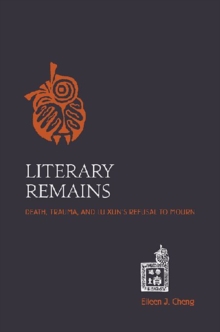Lu Xun (1881–1936), arguably twentieth-century China’s leading writer, is often depicted as the quintessential representative of May Fourth iconoclastic spirit.
Yet his work reflects the ambivalence and contradictions of the larger questions that preoccupied him as a writer and intellectual: How can a culture estranged from its traditions come to terms with its past?
How can a culture, severed from its customs and beliefs and alienated from the foreign conventions it attempts to appropriate, conceptualise its own present and future?
Challenging conventional depictions, Eileen Cheng demonstrates how Lu Xun’s aesthetic experiments are at once much more traditional and revolutionary than previously recognised.
Literary Remains reveals how Lu Xun’s own literary encounter with the modern involved a sustained engagement with the past.
Filled with images of death and decay, his creative writing simultaneously represents and mirrors the trauma of cultural disintegration in content and form.
His wide range of literary experiments actively engage the conventions of traditional literature, while his narratives—contradictory, uncertain, and at times incoherent—refuse to apprehend the world through canonised precepts or teleological notions of history, opening up imaginative possibilities of comprehending the past and present without necessarily reifying them. Behind Lu Xun’s “refusal to mourn,†that is, his insistence on keeping the past and the dead alive in his work, lies an ethical claim: a bid to recover the redemptive meaning of loss.
Like a solitary wanderer keeping vigil at a site of destruction, he sifts through the debris, composing epitaphs to mark both the presence and absence of that which has gone before and will soon come to pass.
In the rubble of what remains, he recovers gems of illumination through which to assess, critique, and transform the moment of the present.
Lu Xun’s literary enterprise was driven by a “radical hope†that his writings might capture glimmers of the past and the present and illuminate a future yet to unfold. Literary Remains will appeal to a wide audience of scholars interested in Lu Xun, modern China, and world literature.|Lu Xun (1881–1936), arguably twentieth-century China’s leading writer, is often depicted as the quintessential representative of May Fourth iconoclastic spirit.
Yet his work reflects the ambivalence and contradictions of the larger questions that preoccupied him as a writer and intellectual: How can a culture estranged from its traditions come to terms with its past?
How can a culture, severed from its customs and beliefs and alienated from the foreign conventions it attempts to appropriate, conceptualise its own present and future?
Challenging conventional depictions, Eileen Cheng demonstrates how Lu Xun’s aesthetic experiments are at once much more traditional and revolutionary than previously recognised.
Literary Remains reveals how Lu Xun’s own literary encounter with the modern involved a sustained engagement with the past.
Filled with images of death and decay, his creative writing simultaneously represents and mirrors the trauma of cultural disintegration in content and form.
His wide range of literary experiments actively engage the conventions of traditional literature, while his narratives—contradictory, uncertain, and at times incoherent—refuse to apprehend the world through canonised precepts or teleological notions of history, opening up imaginative possibilities of comprehending the past and present without necessarily reifying them. Behind Lu Xun’s “refusal to mourn,†that is, his insistence on keeping the past and the dead alive in his work, lies an ethical claim: a bid to recover the redemptive meaning of loss.
Like a solitary wanderer keeping vigil at a site of destruction, he sifts through the debris, composing epitaphs to mark both the presence and absence of that which has gone before and will soon come to pass.
In the rubble of what remains, he recovers gems of illumination through which to assess, critique, and transform the moment of the present.
Lu Xun’s literary enterprise was driven by a “radical hope†that his writings might capture glimmers of the past and the present and illuminate a future yet to unfold. Literary Remains will appeal to a wide audience of scholars interested in Lu Xun, modern China, and world literature.

